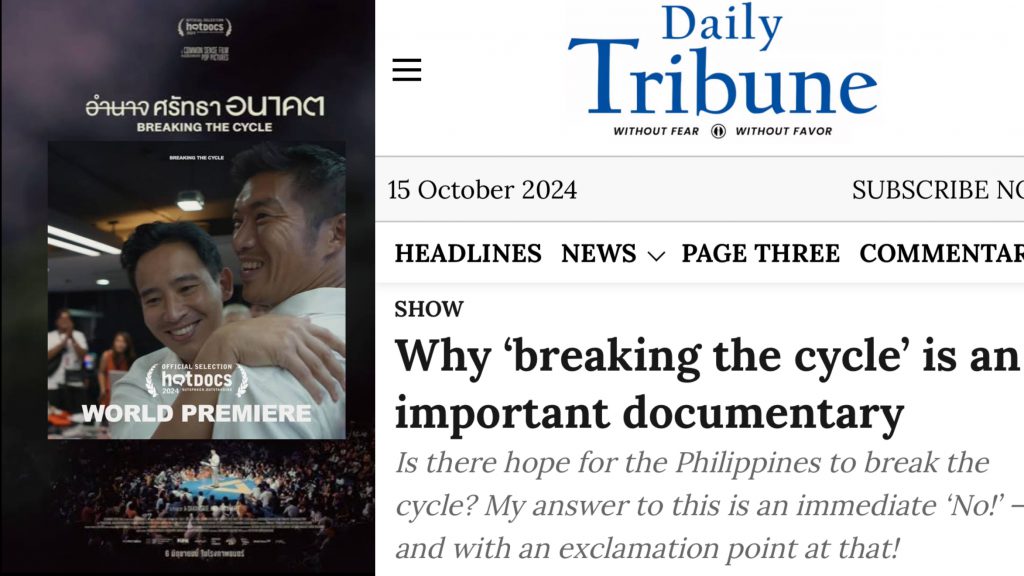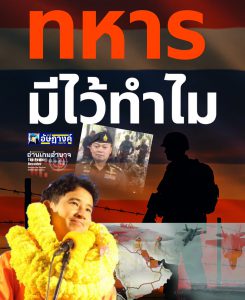
จากบทความวิเคราะห์ของ Daily Tribune เกี่ยวกับหนังสารคดี “Breaking the Cycle” ของธนาธร มีส่วนที่ไม่ตรงกับความเป็นจริงหลายจุด
โดย อัษฎางค์ ยมนาค
1. Daily Tribune เขียนบทความระบุว่า:
สิ่งที่น่ายกย่องที่สุด คือไม่ได้ทำให้ภาพลักษณ์ของรัฐบาลไทยเป็นปีศาจหรือทำให้ธนาธรณ์และนักการเมืองมือใหม่ของเขาดูเหมือนคนที่มีคุณธรรมสูงส่งหรือไร้ที่ติ
As the images of the documentary flickered on the silver screen, what was most praiseworthy about it was that it did not demonize the Thai government’s status quo. Nor did it lionize Thanathorn and his political novices as ultra-virtuous or without faults. It was a balanced documentary that showed how power and politics operate in Thailand. (Daily Tribune)
ความจริงคือ เป็นสารคดีที่ทำให้รัฐบาลไทยเป็นปีศาจหรือเป็นผู้ร้าย ในขณะที่ ธนาธรณ์และนักการเมืองมือใหม่ของเขาดูเหมือนคนที่มีคุณธรรมสูงส่งหรือไร้ที่ติ
2. Daily Tribune เขียนบทความระบุว่า:
เป็นมุมมองที่ตรงไปตรงมาเกี่ยวกับความคิดและความรู้สึกของชาวไทยสามัญเกี่ยวกับสถานการณ์ปัจจุบันของรัฐบาล
It gave an honest take on the thoughts and feelings of Thai commoners about the current state of the government and their aspirations and dreams for the political system. (Daily Tribune)
ความจริงคือ เป็นมุมมองที่เข้าข้างธนาธร และสร้างภาพให้ธนาธรและพวกกลายเป็นพระเอก ในขณะที่รัฐเป็นผู้ร้าย
3. Daily Tribune เขียนบทความระบุว่า:
ภาพยนตร์สารคดีได้รับการตอบรับอย่างดีในประเทศไทย
The documentary film was well-received in Thailand. (Daily Tribune)
ความจริงคือ แทบไม่มีคนไปดู โรงหนังมีที่นั่งว่างเกือบทั้งโรง
ผมขออนุญาตเสนอแนวคิดด้านการสื่อสารการเมืองและความเป็นกลางของสื่อ เพื่อชี้ให้เห็นถึงความบิดเบือนและการสร้างภาพลักษณ์ที่ไม่สมดุลในบทความนั้น ดังนี้:
1. ความเป็นกลางของสารคดีและการสื่อสารการเมือง:
สารคดีควรจะนำเสนอข้อเท็จจริงที่สมดุลและไม่เข้าข้างฝ่ายใดฝ่ายหนึ่ง หากสารคดีนี้มีการนำเสนอภาพที่ดูเหมือนว่าฝ่ายหนึ่งเป็น “พระเอก” และอีกฝ่ายเป็น “ผู้ร้าย” อาจถือว่าไม่สอดคล้องกับหลักการของการสื่อสารการเมืองที่โปร่งใสและมีความเป็นกลาง
ในขณะที่บทความกล่าวว่า “สารคดีไม่ได้ทำให้รัฐบาลไทยเป็นปีศาจหรือทำให้ธนาธรณ์ดูไร้ที่ติ”
แต่หลักฐานเชิงประจักษ์ (empirical evidence) ในกรณีนี้ เช่น ข้อสังเกตจากผู้ชมที่พบว่ามีการนำเสนอด้านบวกของฝ่ายหนึ่งอย่างมาก และการตีความว่าฝ่ายรัฐบาลเป็นตัวร้าย อาจสะท้อนถึงความเอนเอียงในสารคดีนี้ ซึ่งสอดคล้องกับแนวคิดเรื่อง “Agenda-setting” ในรัฐศาสตร์ที่อธิบายว่าสื่อสามารถกำหนดกรอบความคิดของผู้ชมได้อย่างไร
2. การตอบรับของสารคดีในสังคมไทย:
บทความระบุว่าสารคดีได้รับการตอบรับที่ดีในประเทศไทย แต่ถ้าหากในความเป็นจริงมีผู้ชมน้อยหรือโรงหนังมีที่นั่งว่างจำนวนมาก การกล่าวอ้างเช่นนี้อาจบิดเบือนข้อเท็จจริง เพื่อให้ดูเหมือนว่าสารคดีได้รับความสนใจจากประชาชนมากกว่าที่เป็นจริง
การใช้ข้อมูลที่ไม่ตรงกับความจริงในกรณีนี้ขัดต่อหลักการของวิชารัฐศาสตร์ที่ยึดถือข้อมูลเชิงประจักษ์
การสร้างภาพว่าประชาชนสนใจและตอบรับสารคดีนี้อาจเป็นส่วนหนึ่งของ “Political framing” หรือการใช้กรอบความคิดในทางการเมือง เพื่อสร้างภาพลักษณ์ที่เข้าข้างฝ่ายใดฝ่ายหนึ่ง
3. บทบาทของสื่อในการสร้างภาพลักษณ์ทางการเมือง:
สื่อสารคดีมีบทบาทสำคัญในการสร้างและเปลี่ยนแปลงภาพลักษณ์ของบุคคลสาธารณะหรือฝ่ายการเมือง ในกรณีของสารคดีที่กล่าวถึงธนาธรและพรรคการเมืองใหม่ สารคดีมีบทบาทในการนำเสนอธนาธรในฐานะผู้ท้าทายอำนาจและเป็นความหวังของเยาวชน การเลือกนำเสนอแง่มุมที่เป็นบวกของเขาและกลุ่มนักการเมืองใหม่ที่ดูเหมือนเป็น “พระเอก” ในขณะที่รัฐบาลไทยถูกมองว่าเป็น “ผู้ร้าย” อาจเข้าข่ายการใช้สื่อในลักษณะของ “Media bias” ที่สอดคล้องกับแนวคิดรัฐศาสตร์ที่กล่าวว่าสื่อสามารถทำให้ภาพลักษณ์ของกลุ่มใดกลุ่มหนึ่งมีความได้เปรียบหรือน่าสนใจมากกว่าความเป็นจริง
4. ความเป็นไปได้ของการขาดข้อมูลสองด้าน:
สารคดีเชิงการเมืองที่ดีควรจะมีการนำเสนอข้อมูลจากหลายฝ่าย โดยเปิดโอกาสให้มีการสะท้อนมุมมองที่หลากหลาย หากสารคดีนี้ขาดการนำเสนอข้อมูลจากฝ่ายรัฐบาลหรือผู้สนับสนุนรัฐบาลที่สามารถสะท้อนเหตุผลของฝ่ายนั้นได้ ก็อาจทำให้ผู้ชมได้รับข้อมูลที่ขาดความสมดุล ซึ่งขัดกับหลักการของการวิจัยเชิงคุณภาพในวิชารัฐศาสตร์ที่ต้องอาศัยการเปรียบเทียบและวิเคราะห์ข้อมูลจากหลายแหล่งเพื่อให้ได้ข้อสรุปที่ครอบคลุม
หมายเหตุ: การตอบโต้บทความนี้ตั้งอยู่บนพื้นฐานของการตั้งคำถามและวิเคราะห์ข้อมูลตามหลักการทางวิชาการรัฐศาสตร์
………………………………………………………………………………..
Daily Tribune เป็นหนังสือพิมพ์ภาษาอังกฤษที่มีชื่อเสียงในประเทศฟิลิปปินส์ ก่อตั้งขึ้นเมื่อปี ค.ศ. 1999 โดยมีเจ้าของคือ Concept and Information Group, Inc. และมีสำนักงานอยู่ที่เมืองมากาติในกรุงมะนิลา หนังสือพิมพ์นี้ครอบคลุมหลากหลายเนื้อหา เช่น ข่าวในประเทศ การเมือง บันเทิง และบทความวิจารณ์
………………………………………………………………………………..
An Analysis of Media Bias and Political Communication in Documentary Representation
In response to the recent article by Daily Tribune on the documentary Breaking the Cycle, there are significant inaccuracies in the portrayal of this documentary’s approach and public reception. This essay will analyze these discrepancies using principles of political communication and media neutrality to highlight potential biases and the impact of such representations on public perception.
1. Neutrality in Documentaries and Political Communication
The Daily Tribune article praises the documentary for its neutral stance, claiming it does not portray the Thai government negatively or depict Thanathorn and his political colleagues as morally flawless. However, empirical observations from viewers indicate a contrasting perspective. The documentary reportedly frames Thanathorn and his political movement as “heroes” fighting against an oppressive government, thus casting the Thai administration in a negative light. This approach conflicts with the standard of unbiased political communication, which seeks to present a balanced narrative, allowing audiences to form their own opinions based on a comprehensive view of the situation.
Such framing can be analyzed through the concept of agenda-setting in political science, which suggests that media can influence the importance of issues in the public mind. When a documentary amplifies the positive aspects of one party while casting another as the antagonist, it indirectly sets an agenda, guiding viewers to interpret events in a certain way. This selective portrayal undermines the notion of objective storytelling in political documentaries.
2. The Documentary’s Reception in Thailand
The article further claims that Breaking the Cycle was well-received by Thai audiences. However, actual attendance records reportedly show minimal viewership, with theaters nearly empty during screenings. This discrepancy raises concerns about the article’s use of selective information to convey an image of widespread acceptance and interest that does not reflect reality. In academic terms, this could be considered an example of political framing, where certain information is emphasized or downplayed to influence the audience’s perception of an event or individual.
In political communication, accurate representation of public opinion is critical. Misleading claims about the documentary’s reception can create a false consensus, suggesting that the Thai public widely supports Thanathorn’s movement, even if this may not be the case. Such framing may foster a narrative that doesn’t align with the actual political landscape in Thailand.
3. Media’s Role in Shaping Political Image
Media, including documentaries, plays a crucial role in shaping public perception of political figures and movements. The portrayal of Thanathorn as a champion of youth and democracy, juxtaposed with a vilified image of the Thai government, aligns with media bias theories. These theories posit that the media can present information in a way that supports certain narratives or agendas. If a documentary selectively emphasizes the positive attributes of Thanathorn’s movement while ignoring its flaws, it can inadvertently—or intentionally—favor one side over the other.
In political science, such portrayals can have lasting impacts on political landscapes. When media outlets or documentaries adopt a biased stance, they contribute to the formation of polarized public opinions, which can hinder objective political discourse.
4. The Importance of Representing Multiple Perspectives
Effective political documentaries should ideally offer multiple viewpoints, including insights from both supporters and opponents, to provide a balanced understanding of complex issues. The absence of perspectives from the Thai government or its supporters in Breaking the Cycle raises questions about the completeness of the narrative. In academic research, particularly in political science, it’s crucial to incorporate diverse sources to ensure a well-rounded analysis. A lack of counter-narratives in the documentary may lead to a one-sided interpretation of events, which does not align with the principles of thorough qualitative research.
In conclusion, while Daily Tribune presents Breaking the Cycle as a balanced and widely celebrated documentary, critical examination suggests a potential bias in both the documentary and the article. The selective representation of facts and public opinion points to the need for cautious consumption of media, especially in politically charged contexts. Through a more neutral and comprehensive approach, documentaries can foster informed political engagement, rather than reinforce existing biases.
Note: This response is based on questioning and analyzing information in accordance with academic principles of political science.
………………………………………………………………………………..
The Daily Tribune is a prominent English-language newspaper based in the Philippines, established in 1999 and owned by the Concept and Information Group, Inc. This publication covers a variety of topics including national news, politics, entertainment, and commentary. The Tribune’s “Show” section, where the article “Why ‘Breaking the Cycle’ is an important documentary” is featured, often focuses on cultural reviews, entertainment, and lifestyle topics.
……………………………………………………………………………….



